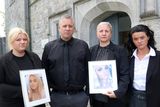People with family history of cancer waiting two years for genetic testing, study finds
A survey of 52 healthcare professionals who work in cancer genetic services found six out of 10 believe testing is under-resourced
People with a family history of cancer are still having to wait up to two years or more for genetic testing that could otherwise alert them before they go on to develop the disease, a new study by researchers at University College Cork has found.
The report, entitled The Unmet Need in Cancer Genetic Services, released today, was commissioned by the Irish Cancer Society (ICS). It found that people with a family history of cancer are struggling with unnecessary stress and anxiety due to a waiting list of more than two years in some cases to find out if they are at a higher risk of developing cancer through genetic testing.
A separate survey of 52 healthcare professionals who work in cancer genetic services said six out of 10 believe testing is under-resourced, while four in 10 expressed concern about access to follow-up surgery for patients deemed to be at a high risk.
As a result, some patients are simply paying for the tests themselves privately, according to lead researcher Prof Josephine Hegarty.
She said: “Health care professionals within the genetic services are doing a good job, however the public cancer genetic services are overstretched. Waiting lists exist at every point on the pathway for people who need genetic services. Many patients spoken to seemed to abandon the waiting for overstretched public services in favour of paying for private testing and treatment.”
Read more
Despite the current backlog of cancer treatment services due to the pandemic, the long waiting lists for genetic testing has been an issue since before Covid-19, said ICS Director of Advocacy Rachel Morrogh.
Noting that between 5pc and 10pc of cancers have a genetic component, she said testing can play a vital role in preventing many cancers, including ovarian, bowel and breast cancer.
“The reality is the focus must be on urgent care, but we’re missing chances to keep people healthy (through genetic testing),” she told the Irish Independent. “We can prevent four in 10 cancers but we have to prioritise prevention.
“There needs to be significant investment and the expansion of capacity across all the follow-on services that someone with a genetic risk of cancer may need, focusing on the development of a dedicated and resourced pathway for them.
“Patients need a dedicated group of multi-disciplinary doctors following them so that they can be offered options and psycho-oncology support when they need it. The Government must now listen to patients and those working in our hospitals and provide more resourcing and staffing.”
Breast cancer patient Margaret Cuddigan said: “Genetic testing was not available to me at diagnosis. In those 13 months waiting for a result I went through chemotherapy, a lumpectomy and radiotherapy on my breast, only for a double mastectomy to be required once the BRCA mutation was known.
“Had I known this earlier, my course of treatment could have been very different. I had to postpone a radiation treatment to go up to Dublin from Cork to do the genetic test, as it would have taken up to another 12 months in Cork, and then I waited over four months for the results.
“Once I received the news of the gene mutation, I had to navigate a path of risk-reducing surgeries.
“I researched and sought out a surgeon myself.
“There were no cross-discipline genetic services available to me to support this journey,” she added.
Join the Irish Independent WhatsApp channel
Stay up to date with all the latest news














